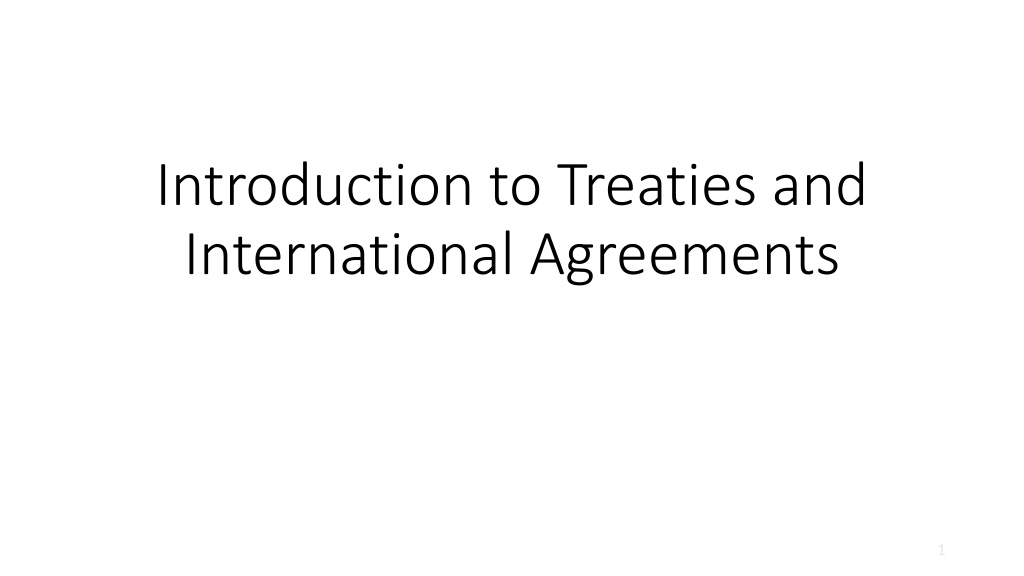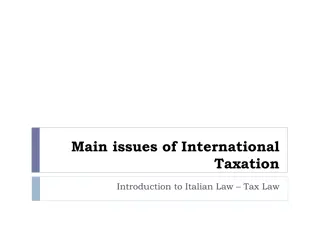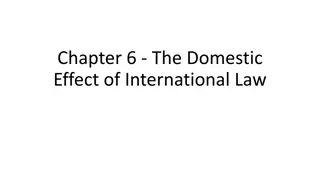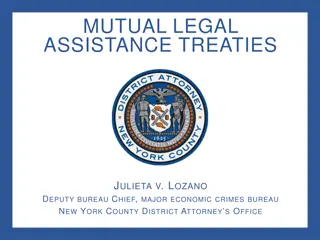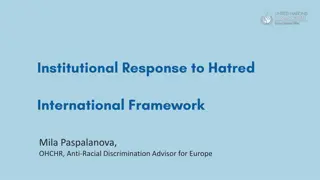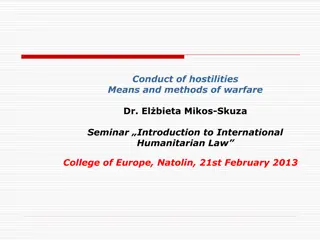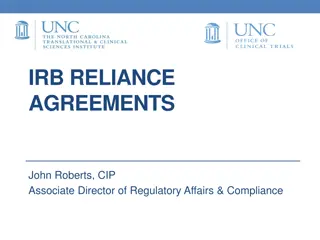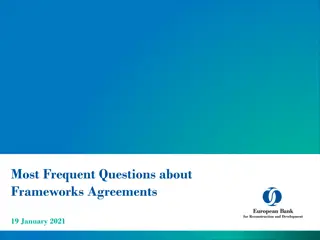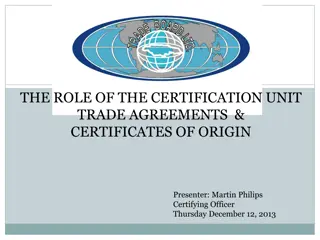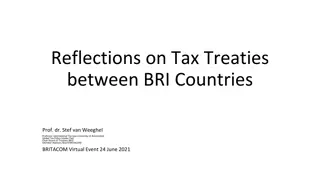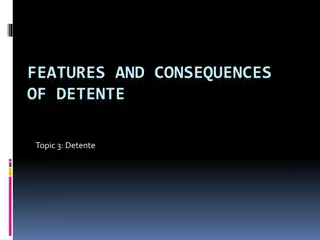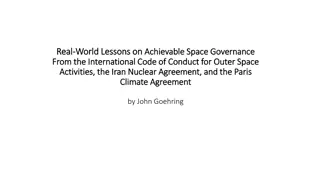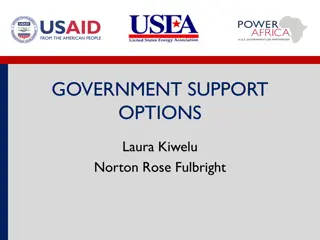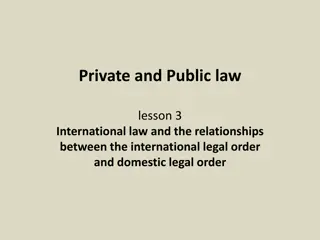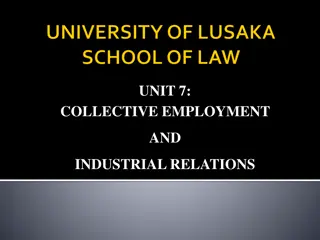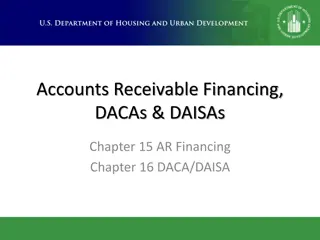Overview of Treaties and International Agreements
Exploring what makes a treaty legally binding, examples of international enforcement systems, international environmental agreements, and the value of international law in promoting shared values and diplomacy. The content emphasizes the importance and implications of treaties in the global landscape.
Download Presentation

Please find below an Image/Link to download the presentation.
The content on the website is provided AS IS for your information and personal use only. It may not be sold, licensed, or shared on other websites without obtaining consent from the author. Download presentation by click this link. If you encounter any issues during the download, it is possible that the publisher has removed the file from their server.
E N D
Presentation Transcript
Introduction to Treaties and International Agreements 1
What Makes a Treaty? (1) the states intend the agreement to be legally binding under international law; (2) the agreement deals with significant matters; (3) it clearly describes the obligations of the parties; and (4) it takes a form consistent with the intent that it be legally binding. If the treaty is meant to be enforced, rather than being purely voluntary, it must also contain its enforcement mechanisms. There are no international bodies which do general treaty enforcement. If the other parties agree, the US may participate even if the Senate has not approved the treaty. 2
Examples of International Enforcement Systems UN Security Council Violations of another member nation s sovereignty. Subject to veto by any security council member. WTO Agree to the dispute resolution system or leave the WTO and give up its protections. Or just ignore it and see what happens, as Trump and now Biden are doing. International Trade Law Follow it, or no one will trade with you International Criminal Court (ICC) Prosecution of individuals International Court of Justice Prosecution of states. 3
Example International Environmental Agreements Basel Convention on the Control of Transboundary Movements of Hazardous Wastes and Their Disposal The Cartagena Protocol on Biosafety Convention on International Trade in Endangered Species of Wild Fauna and Flora (CITES) Convention on the Law of the Non- Navigational Uses of International Watercourses UN Framework Convention on Climate Change International Convention for the Prevention of Pollution from Ships (MARPOL) International Convention for the Regulation of Whaling Kyoto Protocol to the United Nations Framework Convention on Climate Change Law of the Sea (LOS) Long-Range Transboundary Air Pollution North American Agreement on Environmental Cooperation (NAFTA side agreement) Ozone Treaties The Paris Agreement (United Nations Climate Change) Stockholm Convention on Persistent Organic Pollutants (POPS) The US has not ratified many of these 4
The Real Value of International Law It shows shared values. It is a goal for countries to aspire to. It is a standard for diplomacy. 5
Key Principle of Sovereignty A state may not be compelled to do anything it has not voluntarily agreed to do. Except through war, conquest, and blackmail. 7
The President's Role in Making Treaties What are the president's dual roles in treaties? Negotiates the treaty Enforces the treaty Why is the enforcement role critical? Why is the president's role more important in international law? 8
Senate Approval What is the legal effect of approval? Ratification occurs when the President returns the signed and approved treaty to the other participants for acceptance. What does advice and consent mean? Was the senate meant to participate in drafting treaties? What is the downside to senate participation? What if the senate will not approve without changes? Does this undermine the president's constitutional right to negotiate treaties? Fast track - the Senate promises to not mess with the treaty, only to vote it up or down. 9
Enforcement of International Treaties As the Supreme Court said in the Head Money Cases, a treaty depends for the enforcement of its provisions on the interest and honor of the governments which are parties to it. If these fail, its infraction becomes the subject of international negotiations and reclamations . . . [but] with all this the judicial courts have nothing to do and can give no redress. Head Money Cases, 112 U.S. 580 (1884) 10
Abrogating Treaties - Goldwater v. Carter, 617 F.2d 697 (1979) Vacated by United States Supreme Court as non-justiciable What happens if conditions change, say an ally goes communist? Who evaluates these changes? Why not go to the senate to get the treaty modified? When do modifications amount to abrogating the treaty? Who has final authority to send in troops when there is a mutual defense treaty? 11
Executive and Other Agreements Turns out that we sign very few treaties anymore, preferring to do everything with executive agreements 12
Types of Executive agreements Congressional-executive agreements Congress either approves them or delegates approval to the president Agreements made pursuant to treaty Probably implicitly authorized by the treaty Pure executive agreements, such as the Iran hostage settlement and joining the Paris Climate Accord. 13
Legal Status of Executive Agreements Legal authority derives from the president s powers under the constitution and legislation. They do not give him additional powers, but neither do treaties unless enabled by statutes The Case-Zablocki Act requires reporting agreements to Congress What if the president does not comply? It does not make the agreement void. 14
Abrogating Multilateral Agreements Trump abrogated the multinational agreement the Obama administration struck with Iran and other nations in 2015, the Joint Comprehensive Plan of Action (JCPOA), and reimposed U.S. sanctions on Iran. This agreement was recognized by the UN Security Council. Does the US abrogation of the agreement affect its legal status between the remaining signers? What if the US tries to punish them for supporting the agreement? The dollar problem. 15
Domestic Effect of International Law, Treaties, and Executive Agreements 16
Self-Executing Treaties Presidential enforcement requires less detail in treaties because the courts will defer to executive interpretation of the treaty Like Chevron Most treaties do not contain enough specific detail to allow private enforcement This requires Congress to pass legislation to enable the treaty. Treaties with enough detail on their face for enforcement are called self-executing treaties. This is a judicial call, not a bright line. All treaties are subject to constitutional limits. 17
Legislative Enabling of the Treaty What if Congress has passed legislation to enable the treaty? Does the president's abrogation of the underlying treaty change this legislation? How must the legislation be changed? While the president might refuse to enforce the legislation, will the courts be bound to respect this decision as regards private enforcement? Does this legislation have any international significance? Congress may pass legislation with extraterritorial effects but must do so clearly and explicitly. 18
Effect of Treaties and Executive Agreements on State Law Which issues are reserved solely to the federal government? What is the conflict if California decides to have its own foreign policy and passes laws that affect international affairs? California does not get to have foreign policy - American Insurance Ass n v. Garamendi, 539 U.S. 396 (2003) What about executive agreements? Does it matter whether the issue is one that the president controls intrinsically? 19
Can Congress Abrogate International Obligations? The UN Security Council required an economic boycott of Rhodesia What does that tell us about the US president's position at the time on the resolution? Senator Byrd amended a statute to block the boycott Did the court find that this abrogated our treaty obligations? Congress can denounce treaties if it sees fit to do so, and there is nothing the other branches of government can do about it [; thus] the complaint [states] no tenable claim in law. Diggs v. Shultz, 470 F.2d 461 (D.C. Cir. 1972) Did the UN kick us out? 20
Statutory Incorporation of International Law Congress sometimes incorporates international law as part of legislation necessary to comply with treaty obligations. This may be by detailed statute, as criminalizing war crimes as part of the Geneva Convention obligations. It may also be by incorporating general international law concepts into US law and leaving the courts to figure out what they. Is this any special about international law? Can Congress incorporate private standards, such as building codes? 21
What is Customary International Law? Customary International Law is a body of legal rules that restrict the activities of states and are not written down or codified in any particular source. Customary international law arises when a significant number of states consistently engage in a pattern of behavior AND the conviction has developed among states that this behavior is required by international law (otherwise known as opinio juris). Customary international law, like international law defined by treaties and other international agreements, rests on the consent of states. A state that persistently objects to a norm of customary international law is not bound. 22
Jus Cogens In contrast, jus cogens embraces customary laws considered binding on all nations and is derived from values taken to be fundamental by the international community, rather than from the fortuitous or self-interested choices of nations . [T]he fundamental and universal norms constituting jus cogens transcend such consent, as exemplified by the theories underlying the judgments of the Nuremberg tribunals following World War II. This was our legal justification for prosecuting Nazi and Japanese officials for war crimes which were not defined at the time they were committed. 23
What are Examples of Jus Cogens? Examples of jus cogens norms include prohibitions against crimes against humanity, torture, genocide, and human trafficking. In theory, Congress cannot abrogate the US duty to comply with jus cogens. But - are these well-defined terms that would pass a vagueness challenge if used as the basis for a criminal trial in the United States? Congress has defined torture by statute as being what would violate the constitutional prohibition on cruel and unusual punishment. Is that consistent with international norms? 24
Current Supreme Court Justices on International Law Norms as US Law 25
Judge Kavanaugh First, international-law norms are not domestic U.S. law in the absence of action by the political branches to codify those norms. Congress and the President can and often do incorporate international-law principles into domestic U.S. law by way of a statute (or executive regulations issued pursuant to statutory authority) or a self-executing treaty. (Al-Bihani v. Obama) They are not implicitly incorporated in statutes. Incorporation must be explicit.
Justice Alito Congress may act to bring provisions of international law into federal law, but they cannot find their way there on their own. The law of nations is not embodied in any provision of the Constitution, nor in any treaty, act of Congress, or any authority, or commission derived from the United States.
Justice Thomas While Congress, as a legislature, may wish to consider the actions of other nations on any issue it likes, this Court s Eighth Amendment jurisprudence should not impose foreign moods, fads, or fashions on Americans. These are inline with the views of the other conservative justices.
